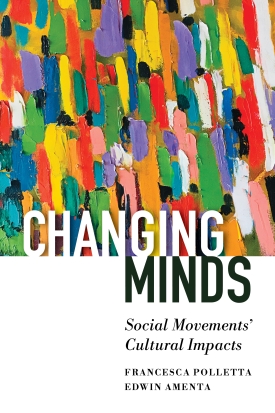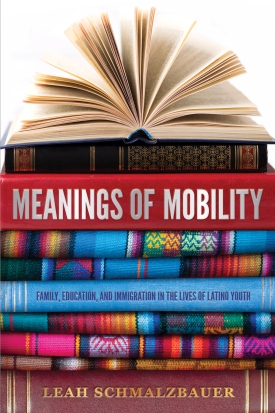“Many studies of social movement influence focus on policy and legislative victories. Changing Minds brilliantly widens the aperture, asking how movements change beliefs and popular culture. This enlightening work illuminates how notable movements of the twentieth century altered the topology of the possible by making resonant claims that transformed the wider contours of American life. Francesca Polletta and Edwin Amenta offer a refreshing view of how struggles gain prominence and provide a lens to understand our unsettled times.”
—WALTER W. POWELL, Jacks Family Professor of Education (and by courtesy) professor of sociology, organizational behavior, management science and engineering, and communication, Stanford University
“Drawing on two lifetimes of research on social movements, Francesca Polletta and Edwin Amenta join forces to illuminate the important interface between social movements and the diffusion of meanings that lead to social and cultural change. The abundant examples they provide from many corners of society help us make sense of the impact change agents can have on the public sphere. These accomplished sociologists also bring together what we know (and more) about various processes that help explain how public opinion changes. I strongly recommend Changing Minds as a most useful contribution that should be read widely.”
—MICHÈLE LAMONT, professor of sociology and of African and African American studies, and Robert I. Goldman Professor of European Studies, Harvard University
“It could be argued that the most consequential and enduring effects of social movements are cultural. And yet, social movement scholars have devoted comparatively little attention to theorizing these effects and the processes and factors that produce them. In Changing Minds, Francesca Polletta and Edwin Amenta have gone a long way toward addressing this lacuna.”
—DOUGLAS McADAM, Ray Lyman Wilbur Professor of Sociology, Stanford University
Social movements—organized efforts by relatively powerless people to change society—can result in legal and policy changes, such as laws protecting same-sex marriage and tax rebates for solar energy. However, movements also change people’s beliefs, values, and everyday behavior. Such changes may help bring about new policies or take place in the absence of new policy, yet we still know little about when and why they occur. In Changing Minds, sociologists Francesca Polletta and Edwin Amenta ask why movements have sometimes had fast and far-reaching cultural influence.
Polletta and Amenta examine the trajectories of U.S. social movements, including the old-age pension movements of the 1930s and 1940s, the Black rights movement of the 1950s and 1960s, the women’s movement of the 1970s, right-wing movements in the 1980s and 1990s, and the environmental movement up to the present, to determine when, why, and how social movements change culture. They find that influential movements are featured in the news, but not only in the news. Movement perspectives may appear also in opinion and commentary outlets, on television talk shows and dramas, in movies, stand-up comedy, and viral memes. Popular culture producers remake movement messages as they transmit them, sometimes in ways that make those messages compelling. For example, while the news largely ignored feminists’ challenge to inequality in the home, popular cultural outlets turned “liberation” into a resonant demand for women’s right to self-fulfillment outside the home and within it. Widespread attention to the movement may lead people to change their minds individually. But more substantial change is likely when companies, schools, and other organizations outside government strive to get out in front of a newly legitimate issue, whether environmental sustainability or racial equity, by adopting movement-supportive norms and practices. Eventually, ideas associated with a movement may become a new common sense—though not always the ideas that the movement intended.
Throughout Changing Minds, Polletta and Amenta provide activists with strategies for getting their message heard and acted on. They suggest how movement actors can get into the news as political players or experts rather than lawbreakers or zealots. They show when it makes sense for activists to work with popular cultural producers and when they should create their own cultural outlets. They explain why the routes to cultural influence have changed and why urging people to take one easy step to save the planet can do more harm than good.
Changing Minds is a fascinating exploration of why and how some social movements have caused profound shifts in society.
FRANCESCA POLLETTA is Chancellor’s Professor of Sociology, University of California, Irvine
EDWIN AMENTA is Professor of Sociology, University of California, Irvine









